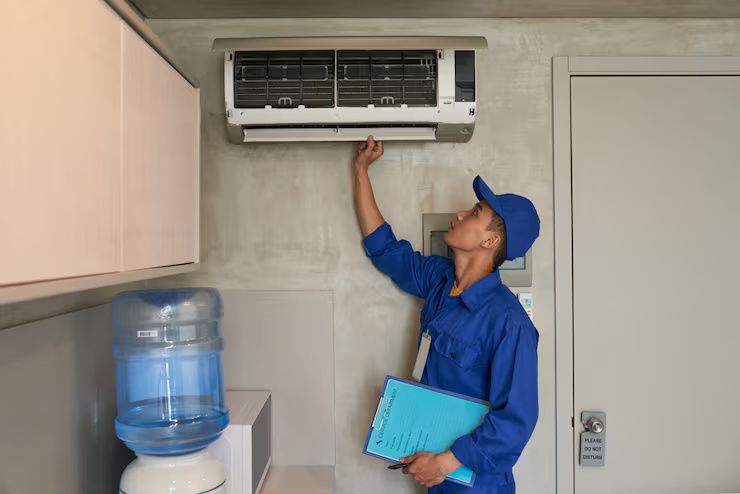Explore the Importance of Regular AC Service for Home and Office
AC service refers to regular maintenance, inspection and repair of air conditioning in residential, commercial or industrial locations. This includes cleaning air filters, controls cold levels, inspects electrical components and ensures the correct airflow

Routine AC maintenance has many benefits for homeowners and businesses:
-
Energy efficiency: A well -maintained AC uses much lower force than a neglected.
-
Extended service life: Timely service prevents premature breakdowns and saves money on compensation.
-
Better air quality: Cleaning or replacement of filters helps reduce dust, allergies and indoor contamination.
-
Low repair cost: Initial detection of problems through regular checks can prevent expensive repair.
-
Better rest: A well -working AC maintains continuous cooling and air flow.
This topic is especially important for people living in excessive heat, old HVAC systems or people living in urban areas where pollution and air quality indoors are major concerns. Office, store shops, schools and health services are also much more dependent on good serving alternating current units to maintain comfortable and safe environment.
Newer updates and industry trends (2024–2025)
-
Smart AC service: Several companies integrate IoT-based diagnostics and predictive maintenance to reduce service calls and downtime.
-
Cooling medium phase-out: Environmentally harmful refrigerant, which is phased out in favor of green areas such as R-32 and R-410A.
-
ECO-friendly service practice: The emphasis on sustainable service techniques increases, including recycling of old parts and the use of non-toxic cleaning agents.
-
Increasing demand for AMC (annual maintenance contract): Customers are quickly selected for annual services to ensure cost -effective maintenance.
-
Remote diagnostics: Many smart AC brands now provide apps or external system status checks and troubleshooting.
Governments and organizations have also provided guidelines for energy efficiency and cold use, and pressed manufacturers and service providers against more sustainable practice.
Rules and guidelines affecting the AC service
AC service is influenced by many laws, environmental standards and security policy in many countries:
-
Energy measurement standards: In countries such as India, the Bureau of Energy Efficiency (Bee) ACS considers ACS on energy consumption. Service should ensure compliance with these rankings.
-
Winter regulations: Globally, laws the use of ozone-led substances limits. Service technicians should be certified to handle refrigerants per EPA (USA), MOFCC (India) or other country -specific standards.
-
Consumer protection: There are laws in many countries that require clear invoices, guarantee conditions and fair practice in home service service.
-
Technical Certificate: Service providers may legally require a license or certificate (for example, HVAC certificate) to perform certain tasks.
It is important for consumers to hire technicians or companies that follow these legal requirements to avoid punishment or inefficient service.
Useful tools and resources for maintenance of AC
Mobile apps and websites
-
Urban Company, Housejoy or Thumbtac - for ordering the reliable AC officer.
-
Daikin, LG, Samsung AC Aps -to monitor the system's performance and reminder of service.
-
Energy Saver (U.S. DOE) - Advice on the cooling of the home for the system adaptation.
Helpful maintenance tools
-
Digital thermometer – For checking outlet air temperature
-
Fin comb – To straighten condenser coil fins
-
Vacuum pump – Used in refrigerant replacement
-
Leak detectors – To identify refrigerant leaks early
Service Checklist (often provided by HVAC service firms):
-
Clean air filter and evaporation coil
-
Inspection the cold level and if necessary, above
-
Lubricate the engine parts and check the noise
-
Tighten the power connection
-
Test thermostat functionality
For household owners, when and what needs to be done before the summer or after the monsoon must be a seasonal AC service check list.
Frequently asked questions (common questions)
How many times should I earn AC?
It is recommended to operate AC at least once a year. In areas with heavy use or pollution, twice a year before service and after summer - ideal.
What does a standard AC service include?
This usually includes filter cleaning, spiral inspection, cold controls, drainage checks and general performance tests.
Is AC service needed for new devices?
Yes. Even new devices require cleaning of filters and flush control after some use. Regular maintenance also helps maintain warranty conditions.
Can I clean AC myself?
You can clean the outer parts and filter yourself, but deep cleaning and check should be done by trained technicians.
How much time does a specific service take?
A standard alternating current service usually takes 45 minutes to 1 hour per unit. However, deep chemical cleaning may take longer.
Final thoughts
Regular air conditioning exceeds a seasonal work - this is an important factor in maintaining indoor comfort, energy saving and the life of the system. Whether you are a homeowner or a business operator, informed and active with AC maintenance, help you avoid disruptions and ensure that your atmosphere remains clean, calm and effective year to year.
